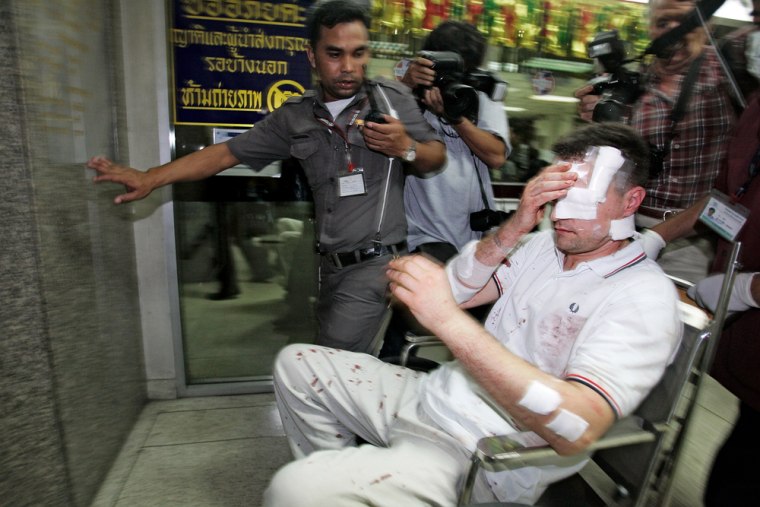Thailand’s military-backed government named supporters of ousted Prime Minister Thaksin Shinawatra on Monday as unofficial prime suspects in New Year’s Eve bombings that killed three people and wounded 38 in the capital.
Nine foreigners were among the wounded after nine small bombs exploded across Bangkok and its environs Sunday night. The attacks caused city authorities to shut down large-scale celebrations, and raised concerns about Thailand’s stability, shaky economy and thriving tourism industry.
The government deployed more army troops and police Tuesday to Bangkok’s international airport and bus and train terminals as holiday makers returned to the capital, said military spokesman Col. Sansern Chaengkamnerd.
The bombings capped a year of unrest in Thailand, including a military coup three months ago and an increasingly violent Muslim insurgency in the south.
No proof
Nobody has claimed responsibility for the bombings, but the government is focusing on supporters of the former regime — though it has named no one specifically and presented no proof.
“From the evidence we have gathered, there is a slim chance that it is related to the southern insurgency,” Prime Minister Surayud Chulanont said. “It is likely related to people who lost their political benefits,” he explained, referring to Thaksin’s ousted regime.
A bloodless Sep. 19 coup against Thaksin was the culmination of months of tensions, as a popular movement staged protests demanding he step down for alleged corruption and abuse of power.
Despite the takeover by the military, which installed Surayud as head of an interim civilian government, political calm has not been restored and the coup leaders accuse Thaksin’s supporters of trying to stir unrest.
Thaksin, who has been barred from the country since the coup and is traveling in China, said through his lawyer that he had nothing to do with the bombings. He condemned the attacks and called the allegations of his involvement “unfair.”
“Thaksin was elected by the people and even during the time of conflict, he has refrained from using violence,” Thaksin’s lawyer Noppadol Patama told a news conference in Bangkok. “It is very unlikely that a politician who was elected by the people will resort to violence.”
Although Western embassies issued warnings to their nationals to exercise caution because of the possibility of fresh attacks, many tourists in Bangkok — including at least one of the wounded — took the violence in stride.
The wounded foreigners included four Hungarians, three Serbians and two British citizens. Two remained hospitalized.
“I can’t see why this would deter me from coming back,” said Paul Hewitt, 55, a retired flight attendant from Horsham, England.
An explosion in a crowded shopping district drove a piece of debris deep into Hewitt’s left arm. He was hospitalized overnight and discharged Monday.
Impact on tourism?
Still, travel industry insiders and analysts worried about the bombings’ effects on tourism, a major revenue earner.
About 1 million tourists come each month, and many seek out Bangkok’s elegant temples, blazing-hot food, riotous nightlife and sidewalks jammed with vendors.
“What happened will most certainly hurt tourism, and will likely hurt consumer confidence as well as consumer spending,” said analyst Aekpittaya Iemkongaek of BFIT Securities, who predicted that the fallout from the blasts could cut into economic growth this year.
The bombings dealt a fresh blow to foreign investors’ confidence in the Thai economy, already shaken by a year of political turmoil and inept efforts to control the value of the baht, analysts said.
A long holiday weekend provides a short cooling-off period after the bombings, but weakness in currency and capital markets is expected when trading resumes.
Surayud and army commander Gen. Sondhi Boonyaratkalin both dismissed speculation that Islamic separatists were responsible for the New Year’s attacks, although militants frequently use small-scale bombings in their insurgency in southern Thailand. The fighting has led to almost 2,000 deaths in the past three years.
Authorities couldn’t find any connection between the southern separatists and the bombings, Sondhi said. The insurgents, he said, “can’t fight a battle in unfamiliar territory,” such as Bangkok.
Pretext to continue martial law?
Several analysts said that the military or a faction within it may also have been responsible. They may have sought, analysts said, to demonize the former prime minister and provide a pretext to continue martial law, imposed during the September takeover.
“That is one theory ... a conspiracy theory that this may be a bid for the military to stay on in power,” said Ji Ungpakorn, a professor at Bangkok’s Chulalongkorn University, who opposed both Thaksin and the coup.
“But I don’t believe it, as much as I don’t believe that Thaksin is behind this,” he said. “Both sides have more to lose than to gain.”
Ungpakorn said he suspected the attacks were linked to southern militants.
Most analysts interviewed, though, said supporters of the ousted prime minister were the most likely suspects. The goal of the bombers, the analysts said, may have been to destabilize the new government and possibly provide an opening for Thaksin’s return.
“We can see what the bomb blasts have accomplished. It has undermined the government’s credibility,” said Thitinan Pongsudhirak, a political scientist at Chulalongkorn University.
